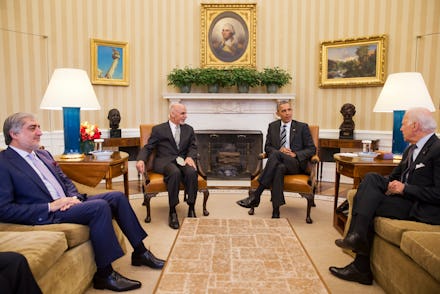President Obama to Halt Exit of U.S. Troops From Afghanistan, Extending 13-Year-Old War

The longest war in American history will continue well into 2016, with no end in sight.
After a series of meetings between President Barack Obama and his Afghan counterpart, President Ashraf Ghani, the White House revealed Tuesday that the administration would delay a planned drawdown of U.S. troops fighting the Taliban in Afghanistan, scrapping a schedule that called for more than 4,000 to leave the country by Dec. 31, 2015, and a full withdrawal by the end of 2016.
"Based on President Ghani's request for flexibility in the U.S. draw down timeline, the U.S. will maintain its current posture of 9,800 troops through the end of 2015," the White House and Afghan officials said in a joint statement. "The specific trajectory of the 2016 U.S. troop drawdown will be established later in 2015 to enable the U.S. troop consolidation to a Kabul-based embassy presence by the end of 2016."
The long goodbye: The announcement should not come as a complete surprise. In November, the New York Times reported that the White House had begun to shift its posture in the region, signing off on a new program to allow "American jets, bombers and drones to support Afghan troops on combat missions." The administration had previously sought to cede those more aggressive and dangerous operations to Afghan forces by the beginning of this year.
In a joint news conference with Ghan on Tuesday, Obama sought to downplay the delay in ending the 13-year-old conflict.
"We're essentially moving the drawdown pace over to the right by several months in part to compensate" for the time it took Afghanistan to form its new government, the president said. The decision was made "because we want to make sure we're doing everything we can to help Afghan security forces succeed, so we don't have to go back."
Intended or not, Obama's warning — that an unfinished fight could mean having "to go back" — brought to mind his heavily criticized decision to remove the last U.S. troops from Iraq in December 2011. The deeply corrupt and dysfunctional government they left behind was no match for ISIS fighters, who streamed in over the Syrian border to claim major cities like Mosul and Fallujah. The U.S. military and western allies are now waging an air war against ISIS in northern Iraq.
What happens next: "This is how wars end in the 21st century," Obama said in a May 2014 speech setting the Afghan timeline. "Not through signing ceremonies, but through decisive blows against our adversaries, transitions to elected governments, security forces who take the lead and ultimately full responsibility."
Even as he ditched his best laid plains on Tuesday, the president offered an ironic confirmation of the message he delivered in those 2014 remarks. Modern war is exceptionally easy to start and progressively more difficult to end. The last chapter of the long American fight for Afghanistan remains unfinished, and it's become increasingly clear that Obama won't be in the White House to write it.